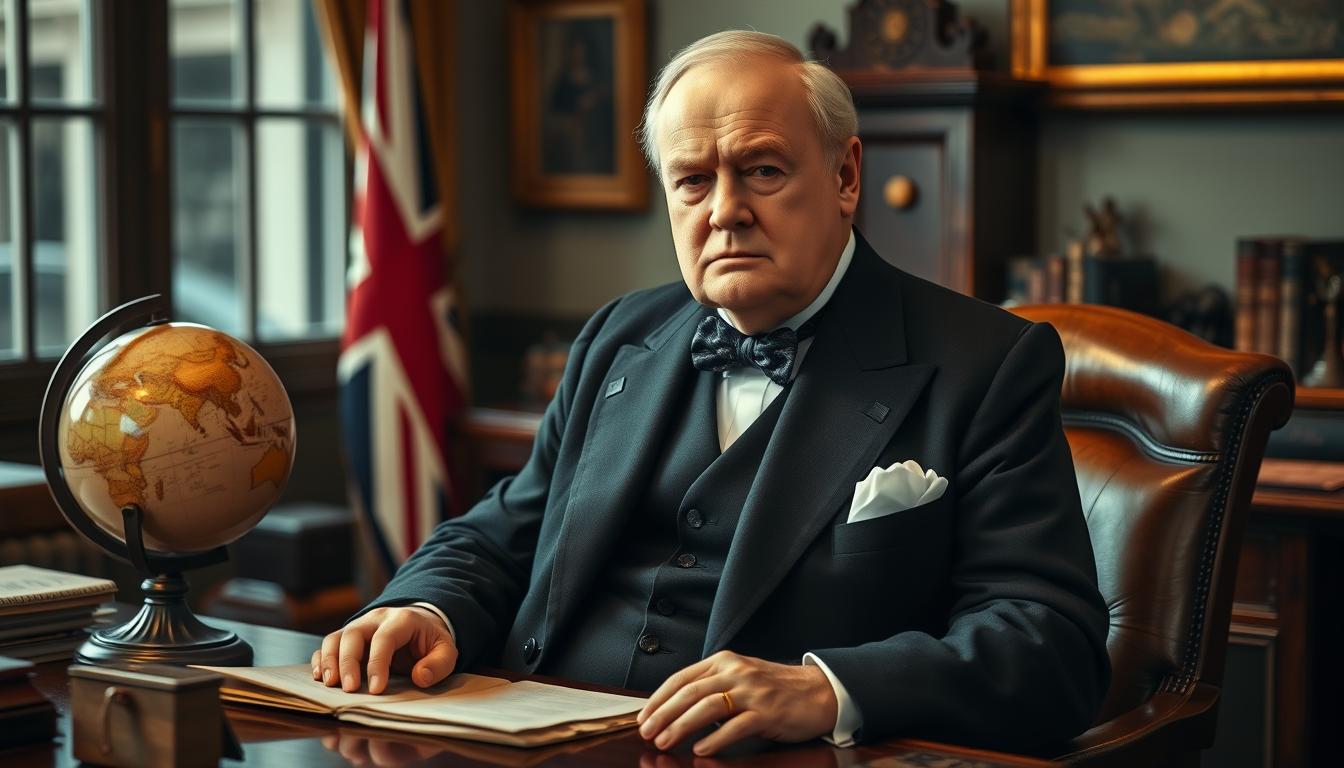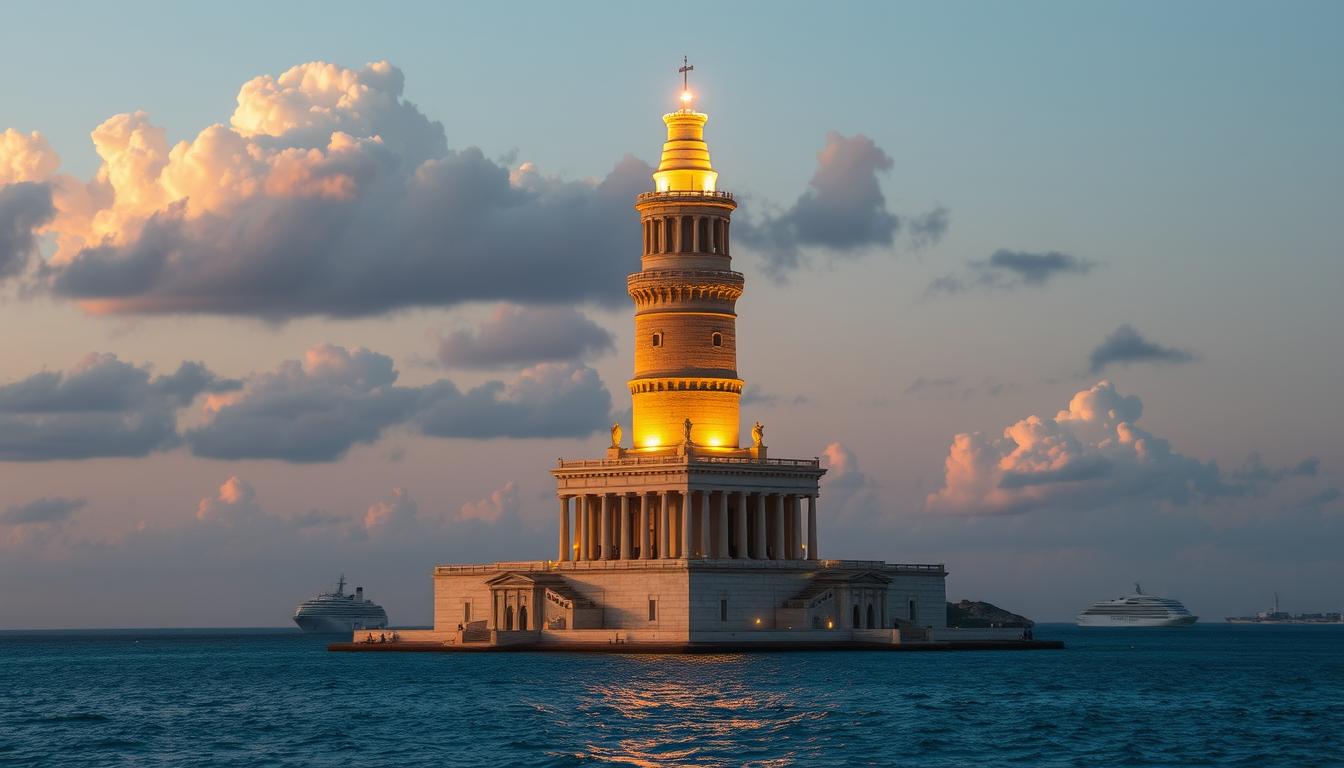Winston Churchill, the iconic figure who guided Great Britain through the tumultuous years of World War II, is widely regarded as one of the most influential leaders of the 20th century. Born into an aristocratic family with a rich heritage, Churchill’s early life was marked by a privileged upbringing and an unwavering dedication to public service. As he rose through the ranks of British politics, his unwavering determination and exceptional oratorical skills would propel him to the forefront of the nation’s leadership during its darkest hour.
Key Takeaways
- Winston Churchill was a legendary British prime minister who led the country during World War II.
- He came from an aristocratic background and had a distinguished military and political career.
- Churchill’s leadership and oratory skills were instrumental in rallying the British people during the war.
- He played a pivotal role in shaping the course of modern history and international relations.
- Churchill’s legacy as a statesman, writer, and visionary continues to inspire people around the world.
Early Life and Aristocratic Background
Winston Churchill was born into a distinguished aristocratic family. His father, Lord Randolph Churchill, was a prominent British statesman. His mother, Jennie Jerome, hailed from America, a socialite of note. This upbringing instilled in Churchill a sense of duty to his nation.
Education at Harrow and Sandhurst
Churchill’s education began at Harrow School, renowned for its emphasis on oratory and military strategy. He then moved to the Royal Military Academy Sandhurst. There, he received his military training and became a commissioned cavalry officer.
Military Service and War Correspondence
Churchill’s aristocratic roots and military training set the stage for a distinguished career. He served with honor in Cuba, India, and Sudan. His work as a war correspondent further solidified his reputation as a courageous and daring individual.
| Military Campaigns | Years | Rank |
|---|---|---|
| Cuba | 1895 | Lieutenant |
| India | 1897-1898 | Lieutenant |
| Sudan | 1898-1899 | Captain |
Churchill’s early life and experiences, influenced by his aristocratic background and military service, laid the groundwork for his illustrious political career. His impact on the world stage is undeniable.
“Success is not final, failure is not fatal: it is the courage to continue that counts.”
– This quote from Winston Churchill reflects his resilience and determination. These qualities were shaped by his early life and military experiences.
Rise to Political Power
Winston Churchill’s entry into British politics was nothing short of extraordinary. Born into a noble family, he quickly developed his skills, serving in the military and as a respected war correspondent. His political career began in 1900, when he was elected to the House of Commons as a Conservative Party member.
Churchill’s rapid ascent through the political ranks was marked by his various government roles. He served as the President of the Board of Trade, Home Secretary, and First Lord of the Admiralty. His strategic brilliance and dedication earned him the respect of his peers. By 1940, during World War II’s peak, Winston Churchill became the Prime Minister of the United Kingdom.
Churchill’s rise to power during this pivotal time showcased his political savvy and ability to inspire the nation. His leadership and determination guided Britain through its darkest moments. His legacy as a pivotal figure in British politics is indelibly etched in history.
“We shall not flag or fail. We shall go on to the end, we shall fight in France, we shall fight on the seas and oceans, we shall fight with growing confidence and growing strength in the air, we shall defend our island, whatever the cost may be, we shall fight on the beaches, we shall fight on the landing grounds, we shall fight in the fields and in the streets, we shall fight in the hills; we shall never surrender.”
This iconic speech, given by Winston Churchill during the Battle of Britain, embodies his unyielding spirit and commitment to his nation. It highlights his remarkable leadership and ability to unite the British people in times of crisis.
Leadership During World War 2
As World War II engulfed the globe, Winston Churchill rose as a beacon of strength and resilience. His leadership during Britain’s “Darkest Hour” galvanized a nation facing the Nazi threat. His resolve inspired a nation to stand firm against the Nazi menace.
The Darkest Hour and Nazi Threat
With France’s fall and the Dunkirk evacuation, Britain faced the Nazi war machine alone. Churchill’s unyielding determination rallied the British people. They stood united, ready to defend their homeland against all odds.
Alliance with Roosevelt and Stalin
Churchill recognized the necessity of a united front against the Axis powers. He formed crucial alliances with President Franklin D. Roosevelt of the United States and Joseph Stalin of the Soviet Union. These partnerships were essential in defeating Nazi Germany and its allies.
Strategic Military Decisions
- Initiated the strategic bombing campaign against German industrial and military targets
- Supported the development of the Enigma code-breaking efforts at Bletchley Park
- Championed the D-Day invasion, a bold and decisive move that turned the tide of the war in favor of the Allies
Churchill’s leadership and strategic vision were crucial in guiding Britain through World War II’s darkest days. His efforts led to the Allied victory, preserving democratic values.
Famous Speeches and Oratory Skills
Winston Churchill’s legacy as Britain’s legendary prime minister is not just about his leadership during World War II. It’s also about his exceptional wit and oratory abilities. His famous speeches captivated audiences worldwide, making him one of the most influential public figures of the 20th century.
Churchill’s oratory prowess was rooted in his mastery of language. He combined powerful rhetoric, vivid imagery, and unwavering conviction in his speeches. These speeches rallied the British people and inspired the world. His iconic “We shall fight on the beaches” address and defiant “This was their finest hour” statement became the backbone of Britain’s wartime morale.
“We shall not flag or fail. We shall go on to the end. We shall fight in France, we shall fight on the seas and oceans, we shall fight with growing confidence and growing strength in the air. We shall defend our island, whatever the cost may be.” – Winston Churchill
Churchill’s oratory skills were evident not just during wartime but also in peacetime. His ability to captivate audiences with his wit, humorous anecdotes, and insightful political commentary solidified his reputation. His “Iron Curtain” speech and eloquent addresses on democracy and freedom continue to inspire and influence political discourse today.
Churchill’s mastery of the English language, combined with his unwavering conviction and ability to connect with his audience, made him a true master of the spoken word. His famous speeches rallied the British nation during its darkest hours. They also solidified his place in history as a legendary orator and statesman.
The Iron Curtain and Post-War Era
After World War II, Winston Churchill became a key figure in global politics. His warnings about the Soviet Union’s threat and the “Iron Curtain” set the stage for the Cold War. This era would shape the decades to come.
Cold War Warnings
In his “Sinews of Peace” address in Fulton, Missouri in 1946, Churchill expressed deep concerns about the Soviet Union’s growing power. He described the division of Europe, saying an “iron curtain” had fallen across the continent. This metaphor vividly captured the emerging divide between the Western Allies and the Eastern Bloc.
Relationship with President Truman
Churchill’s bond with the newly elected U.S. President, Harry S. Truman, was vital in the post-war era. Despite initial challenges, they formed a strong alliance. They recognized the need to work together against Soviet expansionism and the Cold War.
Their partnership led to the Truman Doctrine and the Marshall Plan. These initiatives aimed to stop communism’s spread and help Europe’s economic recovery.
Churchill’s dedication to democracy and his skill in explaining complex geopolitical issues made him a powerful statesman. His warnings about the Iron Curtain and the Cold War remain relevant today. They highlight the lasting impact of this legendary British Prime Minister.
Personal Life and Marriage to Clementine
Behind Winston Churchill’s iconic public image, a deeply personal life thrived. It was filled with love, family, and lifelong companionship. At its core was his wife, Clementine Churchill, who stood by him through both triumphs and trials.
Winston and Clementine’s love story started in 1908 at a ball in Crewe House. Despite their aristocratic backgrounds, they were drawn to each other’s intellect and ambition. They married in 1908 and had five children: Diana, Randolph, Sarah, Marigold, and Mary.
| Winston Churchill | Clementine Churchill |
|---|---|
| Renowned statesman and prime minister | Loyal companion and political advisor |
| Pivotal figure in World War II | Advocated for social welfare and women’s rights |
| Celebrated for his leadership and oratory skills | Played a crucial role in her husband’s political career |
Throughout their marriage, Clementine was Winston’s rock, offering unwavering support and counsel. She often joined him on official trips, providing a calming presence amidst his political turmoil. Their partnership was a blend of love, intellect, and strategic collaboration.
Despite the demands of public life, Winston and Clementine fostered a close-knit family. They instilled in their children a sense of purpose and resilience. Their personal life, though often overshadowed by Winston’s public stature, showcased the enduring power of love and mutual respect.
Winston Churchill: The Artist and Writer
Winston Churchill is famously known for his leadership during World War II. Yet, he also had a deep passion for the arts, especially painting. His artistic talents were more than a hobby; they were a source of inspiration and comfort throughout his career.
Painting as a Lifelong Passion
Churchill started painting in the early 1920s. It became a cherished escape from politics. He often retreated to Chartwell, his country estate, to paint. There, he spent hours capturing the beauty of the landscapes around him.
Over time, Churchill’s painting style evolved. Yet, his works always showed his keen eye for detail and his ability to find peace in chaos.
Nobel Prize in Literature Achievement
Churchill was also a gifted writer, celebrated for his speeches and historical accounts. In 1953, he received the Nobel Prize in Literature. This honor recognized his mastery in historical and biographical writing, as well as his powerful oratory skills.
This achievement highlighted Churchill’s literary prowess and his lasting influence on literature.
| Painting | Literature |
|---|---|
| Churchill’s artistic talent was a lifelong passion, and he created over 500 paintings during his lifetime. | In addition to his political accomplishments, Churchill was also a renowned writer, known for his eloquent speeches and historical narratives. |
| His paintings often depicted the tranquil landscapes of his country estate, Chartwell, providing him with a respite from the demands of politics. | In 1953, Churchill was awarded the Nobel Prize in Literature, recognizing his “mastery of historical and biographical description as well as for brilliant oratory in defending exalted human values.” |
“Painting is a companion with whom one may walk a great part of life’s journey.”
– Winston Churchill
Iconic Image and Personal Habits
Winston Churchill, Britain’s legendary Prime Minister, is renowned for his iconic image. This image, marked by his robust cigar, instantly evokes his powerful presence and unwavering determination. His leadership during World War II solidified his status as a symbol of strength.
Churchill’s personal habits extended beyond his love for cigars. He was known for his distinctive bow ties, which he often wore with his tailored suits. This sartorial flair added to his charismatic appearance, making him a captivating figure on the world stage.
Churchill’s iconic image transcended physical appearance. His mannerisms, such as gesturing with his hands or tilting his head, became instantly recognizable. These subtle nuances enhanced his larger-than-life persona, cementing his status as a true statesman and leader.
Churchill’s personal habits were not just for show; they served a practical purpose. His love of cigars helped him relieve stress and maintain focus during tense wartime decision-making. His bow ties were also practical, keeping his neck warm and comfortable during long hours of work.
In conclusion, Winston Churchill’s iconic image and personal habits were crucial to his public perception. They solidified his legacy as a larger-than-life figure. His unwavering leadership and unyielding spirit guided Britain through its darkest hours.
Political Philosophy and Legacy
Winston Churchill’s political philosophy and legacy are deeply rooted in his unwavering commitment to conservative principles and democratic values. As a lifelong member of the Conservative Party, Churchill championed the ideals of limited government, individual liberty, and the preservation of traditional British institutions.
Conservative Principles
Throughout his political career, Churchill consistently advocated for the Conservative Party’s core beliefs. He believed in the importance of private property rights, free-market economics, and the role of traditional institutions in shaping a stable and prosperous society. Churchill’s conservatism also extended to his staunch defense of the British Empire and his skepticism towards radical social change.
Democratic Values
Despite his conservative leanings, Churchill was also a steadfast defender of democratic principles. He championed the rule of law, the freedom of speech, and the accountability of elected officials to the people. During the darkest hours of World War II, Churchill’s unwavering leadership and defiance of tyranny became a symbol of Britain’s indomitable spirit and the enduring strength of democratic ideals.
Churchill’s political philosophy and legacy have had a lasting impact on the British political landscape. His ideas continue to resonate with conservatives and have influenced the development of modern conservative thought. At the same time, his commitment to democratic values has made him a respected figure across the political spectrum, cementing his status as one of the most iconic and influential leaders in British history.
Second Term as Prime Minister
In 1951, Winston Churchill, the iconic British Prime Minister, made a remarkable comeback to power. He reclaimed his former position after a brief period out of office. Churchill’s second term as Prime Minister in the 1950s politics era was marked by a unique set of challenges and accomplishments. These achievements cemented his legacy as one of the most influential leaders of the 20th century.
Despite his advanced age, Churchill returned to the helm of the government with the same unwavering spirit. This spirit had guided Britain through the darkest days of World War II. His leadership during this period was characterized by a steadfast commitment to maintaining Britain’s global influence. He navigated the shifting geopolitical landscape of the post-war era with determination.
One of the key priorities for Churchill during his second term was addressing the growing tensions of the Cold War. He recognized the threat posed by the Soviet Union and sought to strengthen Britain’s ties with the United States. Churchill advocated for a robust policy of containment against communist expansion. This period also saw Churchill’s famous “Iron Curtain” speech. This speech warned of the Soviet Union’s growing influence in Eastern Europe and laid the foundation for the emerging Cold War dynamic.
Domestically, Churchill’s second term as Prime Minister focused on addressing the economic and social challenges that had emerged in the wake of the war. He worked to rebuild Britain’s industrial base, promote economic growth, and improve the standard of living for the British people. Additionally, Churchill’s government made strides in the areas of healthcare and education. These efforts laid the groundwork for the welfare state that would become a hallmark of the post-war era.
Despite the challenges he faced, Winston Churchill remained a towering figure on the global stage. He commanded respect and admiration from leaders and citizens alike. His second term as British Prime Minister was a testament to his enduring influence. It showed the enduring impact of his visionary leadership on the 1950s politics of Britain and the world.
Historical Impact and Global Influence
Winston Churchill’s legacy transcends Britain’s borders, leaving a lasting impact on the world. As a key figure in modern history, Churchill’s influence has shaped the 20th century and continues to affect global politics today.
Shaping Modern Britain
Churchill’s leadership during World War II solidified his status as a national icon. His unwavering leadership, inspiring speeches, and strategic decisions were crucial in guiding Britain through its darkest times. This ultimately led to Britain’s emergence as a victorious and influential force globally.
Churchill’s vision for a strong, independent, and globally engaged Britain has had a lasting impact. His influence can be seen in the country’s foreign policy, military stance, and international reputation for decades.
International Relations
- Churchill’s skill in forming alliances and navigating global diplomacy was key in shaping the post-war world order.
- His close bond with President Franklin D. Roosevelt and the establishment of the “Special Relationship” between the United States and the United Kingdom set the stage for a lasting transatlantic alliance.
- Churchill’s warnings about Soviet influence and the emergence of the “Iron Curtain” played a significant role in sparking the Cold War. This struggle defined much of the 20th century.
Winston Churchill’s global influence showcases his lasting legacy as a statesman, leader, and visionary. His impact on modern Britain and international relations continues to be felt, cementing his place as a historical giant.
| Churchill’s Impact on Modern History | Significance |
|---|---|
| Shaping Modern Britain | Guided Britain through World War II, cementing his status as a national icon and influencing the country’s foreign policy and international standing. |
| International Relations | Forged the “Special Relationship” with the United States, warned about the rise of Soviet influence, and contributed to the shaping of the post-war world order. |
“We shall not flag or fail. We shall go on to the end, we shall fight in France, we shall fight on the seas and oceans, we shall fight with growing confidence and growing strength in the air, we shall defend our island, whatever the cost may be, we shall fight on the beaches, we shall fight on the landing grounds, we shall fight in the fields and in the streets, we shall fight in the hills; we shall never surrender.” – Winston Churchill
Conclusion
Winston Churchill’s legacy as a pivotal figure in British history is unshakeable. His journey from aristocratic roots to leading the UK through World War II’s darkest times is remarkable. His leadership, strategic mind, and eloquence have solidified his status as a global political giant.
As Prime Minister, Churchill stood firm on democratic values, conservative principles, and against totalitarianism. His partnership with Franklin D. Roosevelt and Joseph Stalin was crucial in defeating the Axis powers. His speeches, like “We shall fight on the beaches,” still motivate leaders and citizens today.
Churchill’s talents extended beyond politics. He was an artist, writer, and historian, earning a Nobel Prize in Literature. His lasting impact as an author and painter showcases his creative genius. The image of Churchill, with cigar in hand, embodies his unyielding spirit and resilience.
Quotessphere.com click here: https://quotessphere.com/
FAQ
Who was Winston Churchill?
Winston Churchill was a renowned British statesman who served as Prime Minister during World War II. He played a key role in shaping modern history. His leadership was crucial in leading Britain to victory against the Nazi threat.
What was Churchill’s role during World War II?
As Prime Minister, Churchill led Britain through its “Darkest Hour” when Nazi invasion loomed. He formed vital alliances with the United States and the Soviet Union. His strategic military decisions were pivotal in the Allies’ victory.
What were Churchill’s famous speeches and oratory skills?
Churchill was celebrated for his exceptional use of language and oratory prowess. His speeches, like “We shall fight on the beaches” and “Iron Curtain,” inspired the British. They had a significant impact on the war’s outcome and the post-war era.
What was Churchill’s personal life like?
Churchill hailed from an aristocratic family and was married to Clementine Churchill. They had five children. Despite his political demands, he maintained a vibrant personal life. He also pursued painting, a lifelong passion.
What was Churchill’s legacy and impact on history?
Churchill is seen as one of the most influential figures in British and global history. His leadership during World War II and conservative politics have left a lasting impact. His commitment to democratic values and literary achievements, including the Nobel Prize in Literature, are also notable.




One thought on “Winston Churchill: Britain’s Legendary Prime Minister”